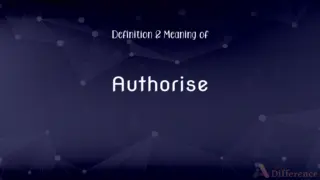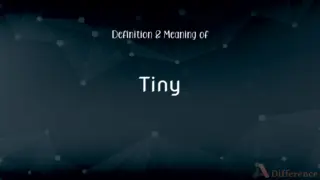Segue Definition and Meaning
By Fiza Rafique & Maham Liaqat — Published on May 28, 2024
Segue means to make a smooth transition from one topic, section, or piece of music to another. e.g., The DJ managed to segue seamlessly from a fast-paced song to a slow ballad.

Table of Contents
Segue Definitions
To bridge two ideas or concepts in writing or speech.
The lecturer segued from historical facts to modern implications.
To move without interruption from one piece of music, part of a story, etc., to another.
The composer was adept at segueing between different musical themes.
To proceed to the next stage of a process or event naturally.
The meeting segued from introductions to the main agenda.
To transition smoothly in conversation from one subject to another.
She managed to segue from casual chat to serious discussion effortlessly.
To make a transition in a movie or play from one scene to another.
The film segued from a dramatic opening to a more lighthearted scene.
To link two sections together in a continuous manner.
The writer segued the book's chapters in a way that the narrative flowed smoothly.
To create a seamless connection in a performance or presentation.
The presenter segued into the next topic without pausing.
To blend one part of a landscape or picture into another.
The garden was designed to segue gently from the lawn into the wildflower meadow.
To shift from one activity or situation to another gracefully.
After the project, he segued into retirement with a series of travels.
(Music) To make a transition directly from one section or theme to another.
To move smoothly and unhesitatingly from one state, condition, situation, or element to another
"Daylight segued into dusk" (Susan Dworski).
An act or instance of segueing.
To move smoothly from one state or subject to another.
I can tell she’s going to segue from our conversation about school to the topic of marriage.
(music) To make a smooth transition from one theme to another.
Beethoven’s symphonies effortlessly segue from one theme to the next.
(of a disk jockey) To play a sequence of records with no talk between them.
An instance of segueing, a transition.
Proceed without interruption; in music or talk;
He segued into another discourse
To change the subject of conversation smoothly and unnoticeably.
During dinner, she segued into a story from her childhood.
Segue Snonyms
Proceed
To continue after a pause or interruption.
The speaker proceeded to the next part of her presentation.
Pass
To go from one condition to another.
The discussion passed from theoretical aspects to practical applications.
Transition
To change from one state or condition to another.
The actor transitioned smoothly between roles.
Shift
To move or cause to move from one place, position, direction, etc., to another.
She shifted the conversation towards a more relevant topic.
Link
To make, form, or suggest a connection with or between.
The documentary linked historical events with current issues.
Move
To go from one place or point to another.
He moved from discussing past achievements to future goals.
Flow into
To move steadily and continuously in a current or stream.
The conversation flowed into deeper, more personal topics.
Lead into
To cause to go with one by holding them by the hand, a halter, a rope, etc. while moving forward.
The teacher led the discussion into a new area.
Merge
To combine or cause to combine to form a single entity.
The two companies decided to merge their resources for the project.
Evolve
To develop gradually, especially from a simple to a more complex form.
The discussion evolved from a simple idea to a comprehensive strategy.
Segue Idioms & Phrases
Segue as a bridge
Using a transition as a connecting point between two different elements.
The dialogue served as a segue as a bridge between the movie's opening and main storyline.
Find a way to segue
To look for an opportunity to transition.
She found a way to segue from work topics to more personal stories during the dinner.
A narrative segue
A transition within a story that connects scenes or chapters.
The narrative segue was so subtle that readers hardly noticed the time jump.
Smooth segue
A transition that is executed without any noticeable interruption.
The smooth segue between songs impressed the concertgoers.
Segue into laughter
To transition into laughter or a lighter mood.
His joke caused the tense meeting to segue into laughter.
Segue into a new chapter
To transition into a new phase or stage.
After graduation, she segued into a new chapter in her life.
Segue Example Sentences
He found it hard to segue back to work mode after his vacation.
Common Curiosities
Why is it called segue?
It's called "segue" from the Italian word "segue," meaning "follows," reflecting its use to indicate a smooth transition.
How do we divide segue into syllables?
Segue is divided into syllables as se-gue.
What is a stressed syllable in segue?
The stressed syllable in "segue" is "se".
How many syllables are in segue?
There are two syllables in "segue".
What is the root word of segue?
The root word of "segue" is the Italian "segue", meaning "it follows".
How is segue used in a sentence?
e.g., The writer skillfully segued from one chapter to the next.
What is the verb form of segue?
"Segue" itself is a verb form.
What is the pronunciation of segue?
Segue is pronounced as /ˈsɛɡ.weɪ/ or /ˈsɛɡwi/.
What part of speech is segue?
"Segue" is a verb.
What is another term for segue?
Another term for "segue" is "transition".
What is the singular form of segue?
"Segue" does not change form and is used the same way for singular or plural subjects.
What is the first form of segue?
The first form is "segue".
Is segue an adverb?
No, "segue" is not an adverb.
Is the segue term a metaphor?
"Segue" can be used metaphorically to describe transitions beyond music or narratives.
What is the opposite of segue?
The opposite of "segue" could be "interrupt" or "disrupt".
Is the word “segue” a Direct object or an Indirect object?
As a verb, "segue" can have a direct object when something is being transitioned. As a noun, it would not be an object.
Is segue a negative or positive word?
"Segue" is neutral; its positivity or negativity depends on context.
Is segue a countable noun?
As a noun, "segue" can be countable when referring to specific instances of transitions.
Is the word segue imperative?
"Segue" can be used in the imperative mood when giving directions, especially in scripts or music.
Which determiner is used with segue?
Determiners like "a" or "the" can be used when "segue" is a noun.
Which preposition is used with segue?
Prepositions such as "into" or "from" are commonly used with "segue".
Is segue an abstract noun?
As a noun, "segue" can be considered abstract since it refers to the concept of transition, not a physical object.
Is segue a collective noun?
No, "segue" is not a collective noun.
Which conjunction is used with segue?
Conjunctions like "and" or "but" can be used when linking phrases involving "segue".
What is the plural form of segue?
"Segue" remains unchanged; it does not have a traditional plural form as it is a verb.
Is segue a noun or adjective?
"Segue" can function as both a noun (meaning a smooth transition) and a verb (to make a smooth transition).
Is segue a vowel or consonant?
The word "segue" starts with a consonant.
Is the word segue Gerund?
Yes, "segueing" can be a gerund when used as a noun.
Which vowel is used before segue?
The vowel used before "segue" depends on the article or preposition; typically "a" or "the".
Which article is used with segue?
Both "a" and "the" can be used with "segue" when it functions as a noun.
Share Your Discovery

Previous Term
Blow Definition and Meaning
Next Term
Grainy Definition and MeaningAuthor Spotlight
Written by
Fiza RafiqueFiza Rafique is a skilled content writer at AskDifference.com, where she meticulously refines and enhances written pieces. Drawing from her vast editorial expertise, Fiza ensures clarity, accuracy, and precision in every article. Passionate about language, she continually seeks to elevate the quality of content for readers worldwide.
Co-written by
Maham Liaqat
































